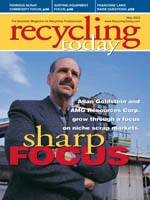t is difficult enough to be a C&D recycler, what with finding markets, buying and maintaining equipment and working to ensure infeed material keeps coming in. But often the biggest headaches are those caused by state and local regulators who oversee the industry.
In that vein, it is interesting to try in a highly unscientific and perhaps slightly biased manner to discuss which states and their regulators really support C&D recycling, and which just give it lip service. Nearly all the states have employees who will say they support recycling, but in which states will recyclers agree that they really do? While recyclers are welcome to disagree with what follows, I feel it is a reflection of overall reports from the field.
Probably some of the most truly supportive states for C&D recycling are in the northeast U.S. New Hampshire, Maine, Vermont and especially Massachusetts have tried to work with most C&D recyclers to promote the business. Nobody’s perfect, of course, but reportedly the recyclers have been able to work with them. Indeed, some are even helping to find new markets.
Florida isn’t too bad, because of a supportive Department of Environmental Protection, although the franchise issue stands in the way of a big expansion of C&D recycling. Minnesota has been supportive. Oregon is OK, but Washington was better before banning all pre-1978 wood from becoming boiler fuel.
Then there is the other end of the spectrum. This list could be longer, but let’s just talk about some egregious examples.
Georgia seems confused, at best. North Carolina keeps threatening to write tough new regulations that will severely hinder C&D recyclers, though in fairness it did recently make common sense rules for portable crushers. New York Department of Environmental Conservation is among the toughest in the nation, sometimes to the point of pointlessness.
Then there are probably the two most anti-C&D recycling states, Texas and California. Texas has a state law that bans operating a crusher within a quarter mile of any building. In other words, to run a portable crusher there must be no building for a half-mile around the site. You can pretty much say goodbye to onsite crushing in that state, as well as the development of new recycling yards.
But the surprise here is California. This is supposed to be the progressive, liberal state that supports all things environmental. Indeed, it is even state law that 50 percent of the state’s waste must be recycled, and C&D is a large part of that waste stream. But the California Integrated Waste Management Board (CIWMB) has passed strict permitting regulations designed to either slow down or put out of business most independent C&D recyclers, to the benefit of the large landfill companies. And now the board, through its landfill advocate member, is after concrete recyclers, trying to make them either shut down their yards or get full solid waste permits for the sites. Whether that can happen under the current regulations, it shows the true feelings of CIWMB toward C&D recycling, because the board did not support the independent recyclers with high recycling rates in favor of the landfill companies who have percentages based largely on alternative daily landfill cover, if they bother recycling at all.
This is not to say regulators don’t have a role in this industry. The very few lousy operators who stockpile waste, take the tipping fee and then just walk away or have fires at their site need to be reined in and driven out of this business. It happens in a lot of states. The regulators just have to remember to make sure the playing field is level and to not just pick on the permitted plants because they know where to find them.

Explore the May 2003 Issue
Check out more from this issue and find your next story to read.
Latest from Recycling Today
- ReMA opposes European efforts seeking export restrictions for recyclables
- Fresh Perspective: Raj Bagaria
- Saica announces plans for second US site
- Update: Novelis produces first aluminum coil made fully from recycled end-of-life automotive scrap
- Aimplas doubles online course offerings
- Radius to be acquired by Toyota subsidiary
- Algoma EAF to start in April
- Erema sees strong demand for high-volume PET systems






